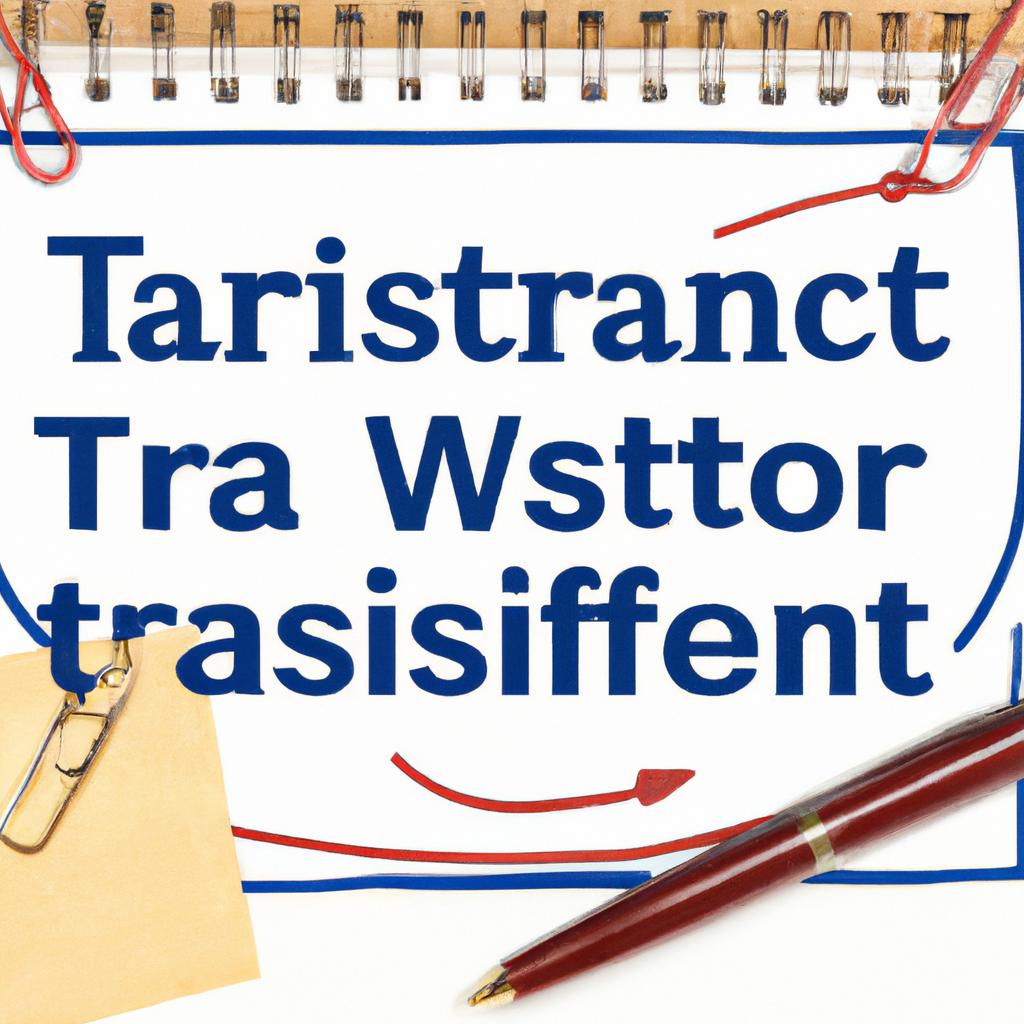In the intricate web of estate planning and post-mortem administration, trust plays a pivotal role in ensuring the smooth transition of assets and responsibilities. However, what happens to trust after someone dies? The concept of trust takes on a new dimension as it navigates the complexities of probate, inheritance, and asset distribution. In this article, we will delve into the nuances of how trust operates in the aftermath of a loved one’s passing, shedding light on the essential considerations and legal implications that arise. Trust, after all, is not solely a matter of faith but a mechanism governed by laws and regulations that must be carefully navigated to honor the wishes and legacy of the deceased.
Understanding the Role of Trusts in Estate Planning
One of the key components of estate planning is setting up a trust. A trust is a legal entity that holds assets for the benefit of designated beneficiaries. After someone dies, the trust continues to operate according to the terms set out in the trust document. This allows for the smooth transfer of assets to heirs and ensures that the deceased’s wishes are carried out.
When someone passes away, the trustee of the trust takes control of the assets held within the trust. The trustee then distributes these assets to the beneficiaries according to the instructions laid out in the trust document. This process helps to avoid probate, which can be time-consuming and costly. By setting up a trust as part of your estate plan, you can provide for your loved ones and ensure that your assets are managed and distributed in accordance with your wishes.

Navigating the Trust Administration Process After the Settlor’s Passing
When a trust settlor passes away, the trust administration process can seem overwhelming. Understanding how a trust works after someone dies is crucial for trustees and beneficiaries. Trustees have the fiduciary duty to carry out the settlor’s wishes and manage the trust assets for the beneficiaries. Here are some key steps to navigate the trust administration process smoothly:
Identify and Notify Beneficiaries: Notify all named beneficiaries of the trust about the settlor’s passing and provide them with a copy of the trust document. Gather Trust Documents: Collect all important trust documents, including the trust instrument, financial statements, and any amendments or instructions left by the settlor. Inventory Trust Assets: Create a detailed inventory of all trust assets, including real estate, bank accounts, investments, and personal property. Manage Trust Assets: Prudently manage and protect trust assets during the administration process. Pay Debts and Taxes: Settle any outstanding debts and taxes owed by the trust to creditors or the IRS.

Ensuring Trustee Compliance and Accountability
After someone passes away, trust becomes a crucial component of ensuring that their wishes are carried out and their assets are distributed appropriately. Trustees play a vital role in this process by managing the trust according to the terms set forth by the deceased individual. Trustee compliance and accountability are essential to maintaining the integrity of the trust and upholding the deceased’s intentions.
Trustees must adhere to certain responsibilities to ensure trust is properly managed, and beneficiaries are protected. Some key ways to uphold trustee compliance and accountability include:
- Regular Communication: Trustees must keep beneficiaries informed about the trust’s administration and decisions.
- Transparency: Trustees should be transparent about their actions and decisions to build trust with beneficiaries.
- Record Keeping: Keeping detailed records of all transactions and decisions made in relation to the trust is crucial for accountability.

Addressing Potential Disputes Among Beneficiaries
When someone passes away, their assets are usually distributed among their beneficiaries according to their will or trust. However, disputes among beneficiaries can arise, especially if there is ambiguity in the will or if there are disagreements over the distribution of assets. It is important to address potential disputes among beneficiaries in order to ensure that the deceased’s wishes are carried out and to prevent costly legal battles.
One way to address potential disputes among beneficiaries is to clearly outline the distribution of assets in the will or trust. Make sure that the document is drafted in a way that leaves little room for interpretation. Additionally, consider appointing a neutral third party, such as a trustee or executor, to oversee the distribution of assets. This can help prevent any conflicts of interest among beneficiaries and ensure that the process is carried out fairly and impartially. **Remember, communication is key in these situations. Encourage open dialogue among beneficiaries to discuss any concerns or questions they may have. By addressing potential disputes early on, you can help avoid conflict and ensure a smooth transition of assets after someone passes away.**
Q&A
Q: How does trust work after someone dies?
A: Trust after someone dies can be a complex and sensitive issue.
Q: Can trust still be formed with the deceased individual?
A: Trust can still be formed with the deceased individual through the execution of their will or trust.
Q: How can trust be honored and maintained after someone passes away?
A: Trust can be honored and maintained by following the wishes and instructions outlined in the deceased individual’s estate plan.
Q: What role does the trustee play in managing trust after someone dies?
A: The trustee plays a crucial role in managing trust after someone dies, ensuring that the assets are distributed according to the terms of the trust.
Q: How can beneficiaries ensure that their interests are protected in a trust after someone dies?
A: Beneficiaries can ensure that their interests are protected in a trust after someone dies by staying informed and communicating openly with the trustee.
Q: Can disputes arise in trust matters after someone dies?
A: Disputes can arise in trust matters after someone dies, especially if there are disagreements among beneficiaries or if the terms of the trust are unclear.
Q: How can trust be a source of comfort and security for loved ones after someone dies?
A: Trust can be a source of comfort and security for loved ones after someone dies by providing a clear plan for the distribution of assets and ensuring that the deceased individual’s wishes are carried out.
Concluding Remarks
In conclusion, the concept of trust doesn’t disappear with death; rather, it evolves and manifests in various forms. Whether it be through legal documentation, the memories we hold dear, or the decisions we make in honor of our loved ones, trust continues to play a crucial role in our lives even after someone has passed on. It is a reminder that the bonds we share with those we love are eternal, transcending even the boundaries of life and death. May we continue to navigate this intricate web of trust with compassion and understanding, knowing that our loved ones are still watching over us, guiding us with their silent presence.
 HOW TRUST IS HANDLED AFTER THE DEATH OF A LOVED ONE
HOW TRUST IS HANDLED AFTER THE DEATH OF A LOVED ONE
Losing a loved one is one of the most difficult experiences one can go through in life. Not only must we navigate our own grief and emotions, but we also have to deal with the practical and legal aspects of our loved one’s passing. One such aspect is handling trust after someone dies. While trust can bring comfort and security to a family during difficult times, it can also lead to conflicts and misunderstandings if not handled properly. In this article, we will dive into the topic of how trust works after someone dies, and provide valuable information and insights to help you navigate this aspect of a loved one’s passing.
What is a trust?
First, let’s define what a trust is. A trust is a legal relationship where a person, known as the grantor or settlor, gives a third party, known as the trustee, the authority to manage and distribute assets to beneficiaries specified in the trust. Trusts are often used to manage and protect assets, provide for loved ones, and avoid probate. Trusts are also commonly used in estate planning to protect assets and ensure their smooth transfer to beneficiaries after the grantor’s death.
Understanding trust after someone dies
When someone passes away, the trust they created during their lifetime will continue to exist. In the case of a revocable trust, the grantor can make changes or even revoke the trust during their lifetime, but after their death, the trust becomes irrevocable, and its terms cannot be altered. Trusts can also be created as part of a will, known as a testamentary trust. In this case, the terms of the trust are only effective after the grantor’s death, and it is subject to probate. The type of trust created will determine how it is handled after death.
Trust administration
After the death of a loved one, the trust administration process begins. This process involves settling the estate of the deceased and distributing assets to the beneficiaries according to the terms of the trust. The trustee, who is responsible for managing the trust, will have to handle several tasks, including:
– Notifying beneficiaries and creditors: The trustee must notify all beneficiaries named in the trust, as well as creditors, of the grantor’s death.
– Assessing and managing assets: The trustee must identify and collect all assets included in the trust and manage them until it’s time to distribute them to the beneficiaries.
– Distributing assets: The trustee must follow the instructions outlined in the trust and distribute the assets accordingly to the beneficiaries.
– Accounting and record-keeping: The trustee must keep detailed records of all assets and transactions related to the trust and provide regular accountings to beneficiaries.
While it may seem like a straightforward process, trust administration can be complex and time-consuming, depending on the type and size of the trust. It is recommended to seek the help of a trust administration attorney or a financial advisor to ensure that all legal requirements are met and the trust is administered correctly.
Trust management
If the deceased did not have a trust in place, their estate will go through a court-supervised process called probate. Probate is a long and costly process and can also become public record, unlike trust administration, which is a private process. The trustee’s main responsibility during trust management is to ensure that the trust assets are managed according to its terms and the beneficiaries’ best interests. This includes investing the trust’s assets, paying taxes and debts, and making distributions to beneficiaries.
Trust disputes
Trusts can sometimes lead to disputes or conflicts among beneficiaries. Disputes can arise due to disagreements about the interpretation of trust terms or how the trustee is handling assets. In these situations, it is best to seek the guidance of a trust attorney to help resolve any issues and avoid prolonged legal battles among family members.
Handling trust after someone dies can also bring up emotions and tensions among family members, especially if the deceased did not leave clear instructions or the trustee is not adequately communicating with beneficiaries. To avoid conflicts and misunderstandings, it is essential to have open and honest communication with the trustee and to seek professional guidance when needed.
Benefits and practical tips
While the passing of a loved one will always be a difficult and emotional time, having a trust in place can provide numerous benefits. Some of these benefits include:
– Avoiding probate: Assets held in a trust do not go through the probate process, which can be time-consuming and costly.
– Privacy: Trusts are private and confidential, unlike probate, which becomes part of public records.
– Control over assets: Trusts allow the grantor to specify how their assets will be managed and distributed after their death, giving them control over their estate.
To ensure a smooth and efficient management of a trust after someone’s death, here are some practical tips to keep in mind:
– Keep the trust document updated and make sure that all assets are properly titled in the name of the trust.
– Communicate openly with the trustee and beneficiaries throughout the trust administration process.
– Seek professional guidance from attorneys or financial advisors to ensure all legal requirements are met.
Case studies
Let’s take a look at some common scenarios where trust plays a crucial role after someone dies.
– In the case of a married couple with children, if one spouse passes away, the trust will continue to operate, and the surviving spouse will become the sole trustee and beneficiary. The trust will specify how the assets will be distributed after the death of both spouses.
– If a parent creates a trust for their minor children, they can specify when and how the assets will be distributed to their children. This provides peace of mind knowing that their children’s financial well-being will be taken care of even after their death.
First-hand experience
“I recently lost my father, who had a trust in place. As the trustee, I was responsible for managing and distributing his assets according to his wishes. It was a daunting and overwhelming task, but having open communication with my siblings and seeking professional guidance made the process a lot smoother. It also provided peace of mind knowing that my father’s legacy and assets were protected and handled according to his wishes.” – Mary, 42.
In conclusion, trust is a valuable tool to protect and manage assets during and after someone’s death. Whether you are a grantor, trustee, or beneficiary, understanding how trust works after someone dies can help you navigate this aspect of a loved one’s passing with ease. Communication, professional guidance, and keeping the trust document updated are key to ensuring a smooth administration and management of a trust.

